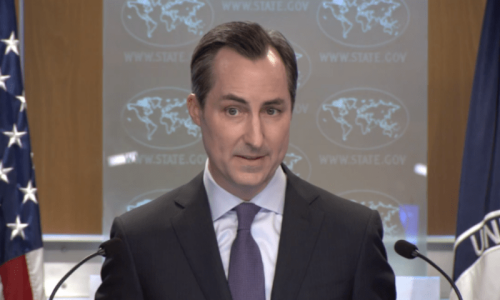
WASHINGTON: The United States wants Pakistan to do more in the fields of counter-terrorism, counter-insurgency and intelligence to qualify for the resumption of US military aid, the State Department said on Monday.
And at a briefing at the Pakistan Embassy, Ambassador Husain Haqqani said that Pakistan could not ignore ‘ground realities’ while responding to US demands for doing more.
However, both Mr Haqqani and State Department spokesperson Victoria Nuland expressed a strong desire to overcome differences, pointing out that the United States had only paused and not stopped its military aid to Pakistan.
Pakistani and US diplomats noted that of the $800 million halted by the Obama administration; about $300 million was for American trainers and their equipment. Since Islamabad has already asked Washington not to send the trainers, the US could not have continued that portion of its assistance. “I think that the United States continues to seek a constructive, collaborative, mutually beneficial relationship with Pakistan,” said Ms Nuland.
“Both Pakistan and the US are committed to working towards resolving these issues but building trust requires patience,” said Ambassador Haqqani. “Both sides suffer from a lack of harmony,” he said, “but this does not mean this is the end of the road.
It is in the interest of both to continue this relationship”.
Ms Nuland explained that some of the differences between the US and Pakistan “go to our intelligence relationship” and both sides had also been “looking to improve our cooperation in counter-terrorism, in counter-insurgency, and they’re a number of aspects there that need to be improved”.
She pointed out that the US civilian assistance to Pakistan; “continues unchanged” but “certain categories” of military assistance had been paused. These included the money provided for US military trainers but went beyond that, she explained.
“We have had a slowing and a pause in some categories while we work through some of these issues where we have been concerned.”
Ms Nuland noted that Secretary of State Hillary Clinton had made it clear to Pakistan that “when it comes to our military assistance, we’re not prepared to continue providing that at the pace that we were providing it unless and until we see certain steps taken”.
The suspension, however, would not affect other aspects of the US-Pakistan military relationship, she said, pointing out that since Osama bin Laden’s elimination the US had had a series of high-level visits to Pakistan.
“We’ve had our working groups continuing to work on counter-terrorism, counter-IED, all of these things. So that work continues.”
The US, she said, was engaging Pakistan’s “leaders at all levels, but certainly at the highest levels, on the road ahead”.
Asked when the US informed Pakistan about its decision to pause the aid, Ms Nuland said: “We’ve been in constant contact with the Pakistanis about these issues throughout those high-level visits and in the weeks since.”
“Ambassador Mark Grossman and Ambassador Haqqani were on the phone even this morning, and those conversations will continue,” she added. Asked what steps the US wanted Pakistan to take for removing the suspension, she said: “I’m not going to get into the precise details, because some of them go to our intelligence relationship.”
When a journalist asked if the step was reflective of the worsening of relations between the US and Pakistan, she said: “It’s no secret that this has been complex, that this has been difficult and that we’re working through the problems at all levels.”
When reminded that the Pakistani military said during the weekend that it had not been notified of the suspension, the US official said: “We’ve been talking to Pakistan at all levels about the issues behind these decisions.” Asked what kind of message the Obama administration was sending to Pakistan by holding back the aid, Ms Nuland said the message was that: “We very much want to cooperate; we think we have mutual interests in getting to the bottom of these problems.”
But “in order to make the assistance effective, we can’t give it in an environment where our trainers are not allowed to be there and, in other circumstances, it doesn’t make sense to move forward with it unless and until our dialogue gets to a better level”.












































Dear visitor, the comments section is undergoing an overhaul and will return soon.